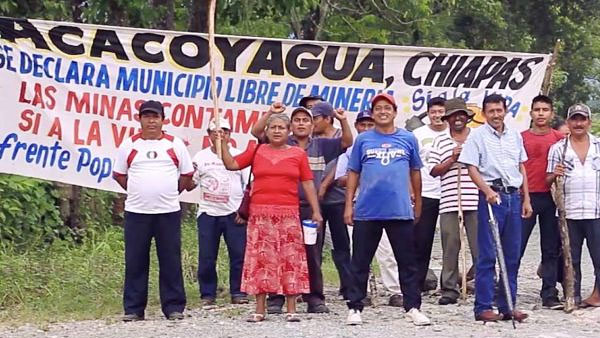| Criminalizing Resistance: Militarization, Murder, and Extractivism in Chiapas Kaelyn DeVries - Upside Down World | |
| go to original October 17, 2017 |
|

Acacoyagua residents organized in defense of their community and territory, forming the grassroots resistance movement called FPDS (Facebook/FPDS)
In Mexican communities, capitalism kills.
Since mining companies began extracting titanium and other minerals in 2005, the Acacoyagua municipality in the Soconusco region of Chiapas has seen a substantial increase in the number of new cases of lung, pancreatic, skin, colon, and liver cancer among residents. According to documents obtained from the Mexican Civil Registry, by 2015, cancer accounted for more than 22 percent of the total deaths in Acacoyagua, many of them children and young adults.
Just as the health effects of mineral extraction projects have proven deadly for local populations, so, too, has expressing political opposition to them. In 2009, Mariano Abarca, the leader of an anti-mining movement in Chiapas, was assassinated and Canadian mining firm Blackfire Exploration Ltd., allegedly tied to the murder, was accused of human rights abuses and corruption. In 2016, Gustavo Castro, director of Otros Mundos, an organization in Chiapas whose mission is to create alternatives to global capitalist expansion, was collaborating with Honduran activist Berta Cáceres when he and Cáceres were both shot by unknown gunmen. Castro was taken for dead and survived. Cáceres’ murder came after the Honduran hydroelectric company, Desarrollos Energéticos S.A., waged a campaign to slander Cáceres, labeling her an anarchist, a threat to Honduran sovereignty itself. Castro, now living in exile for his own safety, communicates virtually with his team on the ground in Chiapas, who continue organizing communities in defense of their land, water, and territory.
This trend follows an alarming pattern for activists throughout Latin America. According to Global Witness, from 2010 to 2015 in Mexico and Central America alone, an estimated 194 environmental activists were murdered. In each case, the process is much the same: governments and transnational corporations systematically criminalize grassroots resistance movements, delegitimizing their causes and dehumanizing their supporters. In Mexico, environmental activists are subjected to arbitrary arrests and detention, repression at peaceful protests, defamation, demoralization, and false charges. These actions provoke the use of violence against activists and, when their murders are left uninvestigated and unpunished, work to institutionalize violence as a legitimate strategy for silencing political opposition. In the same way that depictions of Mexican immigrants as criminals increases their chances of being killed at border crossings, the criminalization of environmental activists increases the likelihood of their persecution and death at the hands of interested state and private actors.
The struggle faced by mining communities in Chiapas illustrates the important nexus between global capitalist expansion, state investment in security initiatives, and increasing violence and human rights abuses in communities. It leaves no question as to why activists across the region have dubbed these transnational mining initiatives “projects of death.”
Read the rest at Upside Down World
We invite you to add your charity or supporting organizations' news stories and coming events to PVAngels so we can share them with the world. Do it now!
Celebrate a Healthy Lifestyle
 From activities like hiking, swimming, bike riding and yoga, to restaurants offering healthy menus, Vallarta-Nayarit is the ideal place to continue - or start - your healthy lifestyle routine.
From activities like hiking, swimming, bike riding and yoga, to restaurants offering healthy menus, Vallarta-Nayarit is the ideal place to continue - or start - your healthy lifestyle routine.